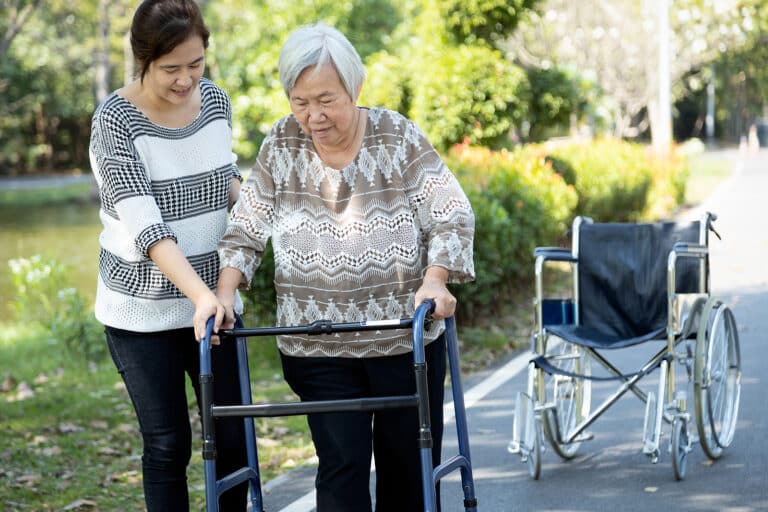I recently visited a senior’s home and encountered a gentleman who was a professional shuffler. Now, you might be thinking he excelled at playing cards, but in reality, this gentleman had mastered the art of foot shuffling. Adorning his feet were thick pairs of woolen fuzzy socks, and his movements on the floor resembled Michael Jackson’s moonwalk, only in a forward motion. As he swayed across the floor, his arms moved in perfect rhythm, pumping back and forth like a man on a mission.
While envisioning a senior performing a shuffled walk might appear harmless, it highlights a significant fall danger. Unfortunately, many seniors become inadvertent “professional shufflers” and may need to consider using mobility aids. Some may be hesitant, perceiving canes or walkers as hindrances rather than helpful tools. However, these aids can significantly enhance the safe mobility of our loved ones, preventing disastrous falls. Before we explore the realm of canes and walkers (keep an eye out for a future article featuring Walkers and Canes), let’s first examine the reasons why mobility aids are beneficial and how these devices enhance the quality of life and contribute to the well-being of our seniors.
Benefits:
1. Stability and Balance:
Many seniors face challenges in maintaining balance, often influenced by various factors. These include specific medications, alterations in the inner ear, balance disorders, or other medical conditions. The struggle with balance is usually the primary reason why the elderly are prone to falls. Canes and walkers offer essential support by providing added stability, aiding seniors in sustaining balance during walking. This is particularly crucial for individuals experiencing dizziness or difficulty supporting their body weight.
2. Fall prevention:
If you have experienced falls in the past, it could be an indication that you would find value in using a walker or cane, particularly if falls have occurred more than once. Mobility aids serve as a supportive system, effectively reducing the risk of future falls. By having a sturdy base of support, canes and walkers assist seniors in navigating their homes and moving around in various settings. For additional insight into fall preventions, refer to a previous blog titled ” Fall Prevention” for valuable tips and tricks to enhance safety within your home.
3. Confidence Boost:
If you feel uncertain on your feet, this sensation might reduce your desire to get out and visit with friends, explore new and exciting activities, or even manage routine chores around your home. Using a mobility aid can significantly boost your confidence! Knowing that there’s a reliable support at hand can empower individuals to feel like they can venture out, socialize, and participate in various activities without the fear of stumbling, thereby having positive effects on mental well-being and prevent social isolation.
4. Pain Reduction:
For seniors dealing with joint pain and mobility issues, canes and walkers can help distribute body weight more evenly, reducing strain on joints. This can alleviate discomfort and make walking a more comfortable experience.
Some individuals may only require a mobility aid if they are recovering from surgery, injury, or illness. Mobility aids provide essential support during the rehabilitation process and enables seniors to gradually regain strength and move at a pace that suits their recovery.
If you notice yourself doing the backward moonwalk or witness a loved one executing the perfect shuffle, don’t hesitate to consult your family physician for a referral to a physical therapist/occupational therapist to be fitted for the appropriate ambulatory device for your needs. The advantages of using mobile aids far surpass any stigma associated with the notion that only older individuals use these devices. By embracing the use of mobility aids, we can recognize their crucial role in enhancing the overall quality of life for seniors, offering support, preventing falls, and promoting independence.
- Seeing Clearly: Glaucoma Awareness for Seniors - March 10, 2025
- The Sounds of Life: Hearing Aid Care for Seniors - March 3, 2025
- Save a Life Today!! ❤️ - February 18, 2025








